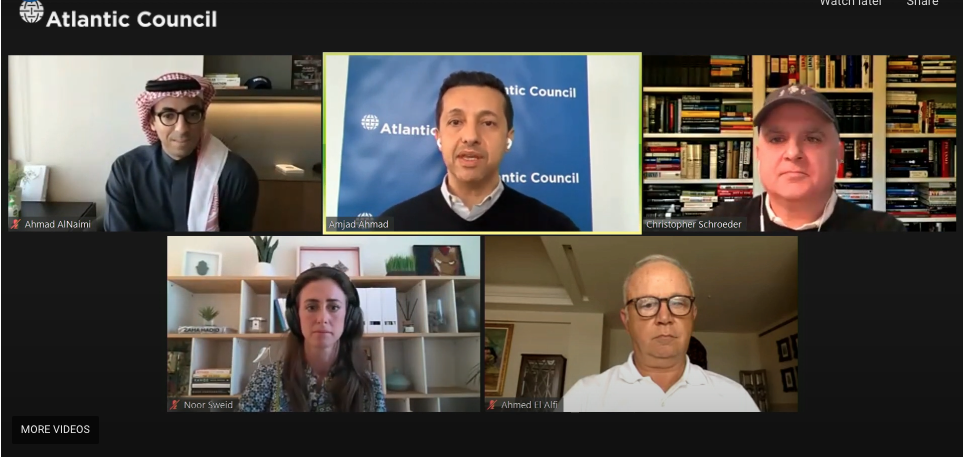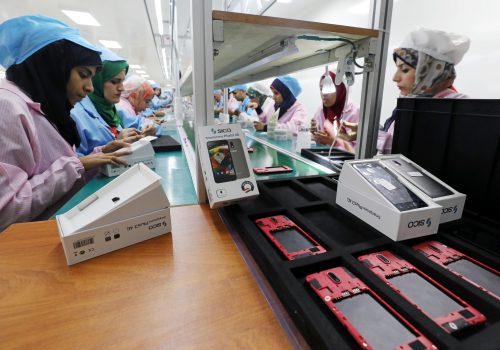The greatest and least understood technology revolution today is not the tech itself—such as artificial intelligence, machine learning, or genomics—but rather the almost universal access to it. Access to smartphones is now enjoyed by over 70 percent of the 4.8 billion phone users worldwide, with smartphone usage having increased by 50 percent in less than five years. This has unleashed billions of new customers in parts of the world we here in America don’t think much about or think of in simplistic stereotypes.
In fact, utilizing an old American playbook, increasing access to technology globally meant that all you had to do was show up where a market was big enough or outsource where labor markets are cheap. Facebook, Instagram, WhatsApp, Google, Intel, and the like have dominated up until now using this model.
This is no longer the case. For the first time, billions of people have local and regional choices. They no longer have to accept one-stop-shop products from the West. They now have access to services more attuned to their realities and cultural differences.
China, of course, is exhibit A of this shift. But “mini Chinas” are rising in large new markets from Jakarta to Mexico City. The largest eCommerce player in Latin America is not Amazon, but Mercado Libre, with a market cap of over $90 billion. The world’s largest neo-bank, Nubank—providing over thirty-four million people in Brazil and beyond access to credit—is valued at over $25 billion. The largest ride-sharing and super app in South East Asia is Grab, whose last investor funding round will well surpass $14 billion. Many more massive exits have happened or are coming.
The Middle East and North African (MENA) startup scene is similarly capturing attention; not only due to the number of quality entrepreneurs, but also the significant acquisitions of regional eCommerce leader souq.com by Amazon (for almost $600 million) and the rideshare platform Careem by Uber for over $3 billion. Last year, venture capital funding in the region surpassed $1 billion for the first time. Countries in the Gulf have leaned forward in regulatory environments to welcome innovative talent and streamline the rule of law to support FinTech and more.
There are enormous advantages demographically. Of MENA’s over four hundred million people, 31 percent are under the age of fifteen. Unlike other ecosystems like China that must navigate an aging population, MENA has an enormous youth “opportunity,” where half or more of the populations in most countries are under thirty-five. Young people are connected—as smartphone penetration exceeds even 100 percent in parts of the Gulf—and are enthralled by entrepreneurship and are beginning to see it as a viable path to economic prosperity. In a societal structure where most graduates expect a government job, this is a game-changer.
In addition to youth, women are often leading the charge. There is some data and anecdotal evidence suggesting that women’s participation rate in startups is higher than most corporations in the region, and women’s entrepreneurship in the Middle East is higher than many parts of the world. While it is still early days, the impact on job creation has been visible, with startups employing thousands of people regionally and, more importantly, making them shareholders in the business (stock options are rare in the region).
And there are many multiplier effects. As companies succeed, more investors are attracted. As companies scale, thousands of employees learn “how it is done” and hundreds will try to build companies themselves. In Silicon Valley, this was once called the “Pay Pal Effect,” as, when Pay Pal was sold, it spun off hundreds of employees, including Reid Hoffman who founded LinkedIn, Max Levchin who founded Affirm, and Elon Musk who founded Tesla. We are seeing clear signs of a “Careem Effect” or “Souq Effect” rising in the region today.
So, are investors poised to pile in? The Atlantic Council’s empowerME initiative just hosted a virtual panel event to answer just that. Ahmed El Alfi of Egypt’s Sawari Ventures, Ahmed AlNaimi of Saudi Telecom Ventures, and Noor Sweid of Dubai’s Global Ventures discussed how a globally competitive venture capital industry would fuel further entrepreneurship and its positive externalities. The conversation highlighted three key strategic areas of focus to help support the venture capital industry become more active and competitive.
Embrace and unleash local innovation and talent
Venture capital investors seek returns, first and foremost, and are looking to commercialize innovation rather than create it. While entrepreneurs are naturally bringing innovation to solve thorny problems and exciting opportunities, there is significant opportunity to support them by developing an innovation engine early on. This means transforming educational institutions to groom twenty-first century talent and enabling research and development (R&D) investment more broadly.
El Alfi noted at the empowerME event that “There are very few companies in the MENA region that can really grow to a global scale without recruiting talent from outside the region.” He added that Egypt’s educational infrastructure has ranked in the bottom 5 percent globally for the past decade. Waiting for physical schools to improve will not suffice. However, El Alfi and Sweid are hopeful that the EdTech sector is ripe for disruption at the hands of entrepreneurs given the leveraging scale and relatively low cost of reaching consumers. “There is a huge problem to fix and a huge market opportunity,” noted Sweid. The education system should align with the needs of the private sector and the jobs of the future and partner with the most forward-thinking government investments in strategic sectors demanding talent.
Government support for technological infrastructure and regionally-focused R&D is a powerful requirement, as we have seen in successful ecosystems from the United States to China. Whether it be autonomous cars or artificial intelligence, these countries have spent billions on cutting-edge innovation that has propelled their economies in the last decade. In addition, unleashing corporate R&D to support entrepreneurs can complement the best ideation or put intellectual property into application.
Support venture capital firms where they need it most
For all the enthusiasm and momentum growing in venture investing, venture capital funding as a percent of GDP in the MENA is approximately 10 times less than the US. As AlNaimi pointed out at the empowerME event, for all the excitement about early investment in entrepreneurs, there is still too little capital available at later rounds for enterprises to accelerate and reach their full potential.
For the first time, significant sovereign wealth funds are backing light and innovative venture capital firms rising across all funding needs and stages. They are becoming more comfortable navigating the speeds and relatively small investment required as compared to the large infrastructure projects they are used to. Their financial engagement and commitment to more open rule of law and transparency also attracts large pools of global capital. And that capital is beginning to show up. The panelists at the empowerME event noted that they have begun to see Chinese investors in the market—both financial and corporates—which bring not only investment but also their own models of success and scale. All panelists predicted that this will accelerate in the coming years.
Equally importantly, governments can significantly mitigate legal risks for investors by improving laws and regulations. Investors, in the end, want to know that the rule of law is clear and that they can deploy capital and exit investments predictably. For example, the most forward-leaning governments affirm and make easier companies’ rights to set up convertible notes and stock options. El Alfi underscored at the empowerME event that consistent adjudication and dispute resolution give investors the highest degree of confidence above all.
It’s all about exits…
Whether local or global, investors seek the best return on their capital. Strong realized returns are the best driver for developing a thriving venture capital industry and investors have plenty of global opportunities now to find them. So, exits are essential and also provide a virtuous cycle where great outcomes inspire interest in more investment. Unfortunately, exits in the region have lagged behind most markets.
For most venture capital firms, there are two primary channels for exits: mergers and acquisitions (M&A) and initial public offerings (IPO). Both of these channels are underdeveloped in the Middle East. M&A activity, which is vital for venture capital firms to sell the bulk of their portfolio, is anemic. To date, public markets have been few, offering limited liquidity and being mired in regulatory friction. The interesting exits have been led by foreign buyers looking to enter the MENA market rather than launch from scratch.
There is opportunity in the IPO realm. El Alfi noted at the empowerME event that one of the recent regional unicorns, fintech enterprise Fawry, went public in the Cairo stock exchange. We expect to see more coming across the region, as well as continued improvements in the regulatory environment.
Given that every company is a tech company—or threatens to be disrupted by tech—we expect there may be more M&A activity within the region as more local and global players—again, including China—arrive to capture the best in innovation.
AlNaimi, El Alfi, and Sweid shared the same central message at the empowerME event: investing in venture capital in the Middle East is not merely an opportunity to gain financial dividends, but also to impact the lives of hundreds of millions of people by adding value and creating local wealth that can then address manifold social challenges. This will allow talent to rise and strengthen the ecosystem further.
Amjad Ahmad is director and resident senior fellow of empowerME at the Atlantic Council’s Rafik Hariri Center for the Middle East. Follow him @AmjadAhmadVC.
Christopher M. Schroeder is the co-founder of Next Billion Ventures and advises Village Global in Silicon Valley. Follow him @cmschroed.
Allison Holle is a program assistant at the Atlantic Council’s Rafik Hariri Center for the Middle East & Middle East Initiatives. Follow her @AllisonHolle.

empowerME at the Atlantic Council’s Rafik Hariri Center for the Middle East is shaping solutions to empower entrepreneurs, women, and youth and building coalitions of public and private partnerships to drive regional economic integration, prosperity, and job creation.




